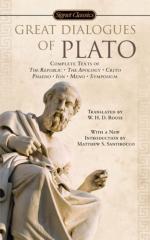
|
| Name: _________________________ | Period: ___________________ |
This test consists of 5 multiple choice questions, 5 short answer questions, and 10 short essay questions.
Multiple Choice Questions
1. Complete the comparison: philosophers have wisdom whereas common men have _______
(a) Opinions.
(b) Expertise.
(c) Judgment.
(d) Obligation.
2. Why does Glaucon continue conversing with Socrates?
(a) Because he is provoked by Adeimantus to do so.
(b) Because he is not satisfied with Socrates' response to Thrasymachus.
(c) Because he agrees with Socrates that injustice is better than justice.
(d) Because he is convinced he can win an argument against Socrates.
3. How does Socrates defend the point that men and women are equal?
(a) Though men are physically stronger, women are emotionally stronger.
(b) Men need women to exist (and vice-versa), so man and woman are better regarded as parts of a whole rather than individuals.
(c) Though they have different external organs, their internal ones are similar.
(d) Though they have different natures, they can perform the same tasks.
4. In Ion, Socrates compares Ion to which of the following?
(a) Greek artists and sculptors.
(b) Musicians.
(c) Plato.
(d) Religious prophets.
5. Where is wisdom found in Socrates' ideal republic?
(a) In Socrates, and others like him.
(b) In the slaves who labor in it.
(c) In the moral law.
(d) In those who rule and order it.
Short Answer Questions
1. What types of stories, according to Socrates, ought we to read to children when they are very young?
2. Describe Thrasymachus' view of Socrates.
3. What do Socrates' interlocutors object to in the beginning of Book V?
4. Whose side is Adeimantus on, at least in the beginning of the dialogue?
5. How does Socrates plan to keep the soldiers of the republic from fighting?
Short Essay Questions
1. Explain the irony of the following statement as it relates to Ion: "Plato is the supreme enemy of art and is also the supreme artist."
2. Does Thrasymachus like Socrates? Why or why not?
3. What is the purpose of Alcibiades late-night intrusion into the Symposium? What does he talk about?
4. What is Socrates' view on poets and soothsayers?
5. What would happen, according to Socrates, if a cobbler exercised the role of a leader?
6. How should soldiers, according to Socrates, be trained in the ideal republic?
7. How does Socrates convince his interlocutors that a woman can do any job that a man can?
8. What is the purpose of Aristophanes' myth about men and women once being unified and then split apart? How does he end his story?
9. Whom does Adeimantus support? Why?
10. Why is Meno's definition of virtue unsatisfactory for Socrates?
|
This section contains 1,294 words (approx. 5 pages at 300 words per page) |

|




